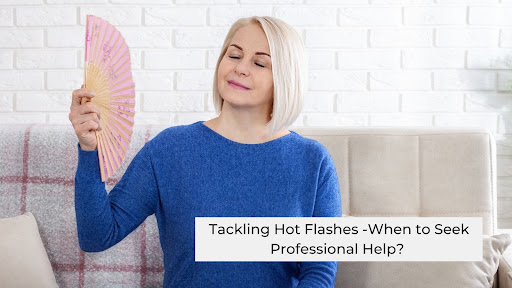Hot flashes and night sweats are two of the most prevalent menopausal symptoms. About 3/4th of women experience these symptoms in their perimenopausal stage. Each woman may experience hot flashes differently. While some may not notice these, for the majority, it would interfere with their everyday activities. Each woman's hot flashes are different, both in terms of intensity and duration.

Hot flashes are quick, abrupt, and episodic feelings of warmth that mainly occur on the upper body, such as the chest, neck, and face, and are immediately followed by perspiration. Hot flashes are frequent in women during their perimenopausal and menopausal stages. The symptoms can sometimes have a detrimental effect on one's quality of life.
Warm environments, hot liquids, or emotional stress can all cause hot flashes. Symptoms like worry, perspiration, heart palpitations, headaches, weakness, and tiredness can accompany hot flashes.
Causes
The exact cause of these abnormal changes in the body that result in hot flashes is unknown. Hormonal changes in the body may cause hot flashes. Their relationship to other health issues, such as diabetes, is also being investigated. Hot flashes are common in those who are obese or have diabetes. While it is barely noticeable in some women, for others, the intensity may harm their quality of life. However, the following are some triggers that can cause hot flashes.
- Declining levels of estrogen
- A disorder in thermoregulation
- Consumption of alcohol and caffeine products
- Consuming spicy foods
- Stress or anxiety
- Wearing a tight dress
- Sedentary lifestyle
- Smoking
Symptoms
Following are the symptoms of hot flashes.
- Heat flashes are usually transient, lasting between 30 seconds to a few minutes.
- Skin redness is known as skin flushing.
- Excessive perspiration and night sweat
- Anxiety and depression
- Palpitations
- Severe mood swing
- Vaginal dryness
- Weight gain
Treatment
Hot flashes might appear to be an unavoidable menopause symptom that you must learn to live with. But, you can reduce your hot flashes with certain treatments.
If your hot flashes aren't interfering with your regular activities, you might not need treatment. If they are bothering you, talk with your doctor about possible treatments. Based on the signs and symptoms, your doctor may determine if you are experiencing hot flashes and may recommend the following treatment options.
Hormone Replacement Therapy
This therapy elevates your hormone levels and helps with some menopause symptoms. If hormone replacement therapy is recommended, your doctor will examine whether your uterus is present or has been removed. Based on the findings, your doctor may recommend:
- Estrogen and progesterone in case your uterus is present.
- Estrogen, if you’ve had surgery to remove your uterus.
Non-Hormonal Medications
Selective serotonin reuptake inhibitors are a class of antidepressants that help lessen the frequency and intensity of hot flashes. These medicines consist of
- Venlafaxine: Much carefully planned research has demonstrated the effectiveness of this medicine. This drug's usual adverse effects include headaches, nausea, altered bowel habits, and high blood pressure.
- Desvenlafaxine: The research material available on the efficacy of Desvenlafaxine is lesser compared to venlafaxine because it is more recent. Nausea, altered bowel habits, headaches, and high blood pressure are typical adverse effects of this drug.
- Fluoxetine: This drug lessens hot flashes. Insomnia, bowel habits, decreased sex drive, and nausea is a few of their side effects. If you are using tamoxifen, you should avoid taking this drug.
- Paroxetine: This medication has FDA approved to treat hot flashes. Frequent adverse effects include weight gain, dry mouth, decreased sex drive, changes in bowel habits, and nausea.
- Gabapentin: This drug frequently helps persons with both hot flashes and sleeplessness fall asleep. Fatigue, nausea, dizziness, disorientation, edema, and weight gain are typical adverse effects.
Nonprescription Treatments
Another alternative for treating hot flashes is using over-the-counter, herbal, and non-prescription medications. These treatments may consist of:
- Acupuncture: It is beneficial and does not have any side effects. Studies have discovered that acupuncture can dramatically reduce menopausal symptoms in women, including hot flashes.
It involves the insertion of thin needles into specific points on the body's surface. These points connect the body's energy channels, and their stimulation promotes healing and relieves symptoms.
- Yoga: This is effective in reducing the emotional stress brought on by menopause. Women have reported improvements in negative consequences of menopause, such as stress, hot flashes, loss of sleep, depression, etc., through regular yoga sessions.
Restorative and supportive yoga positions can calm the nervous system during this phase. Consistent yoga practice may aid in better hormone management, reduce the severity of symptoms, and help women mentally and emotionally prepare for this stage of their lives.
Quick Relief Treatments
Prior to taking medicine, try to make lifestyle changes. If hot flashes keep you awake at night, try cooling down your bedroom and drinking small quantities of cold water before bed. Some lifestyle modifications you can make may include:
- Wear dresses in layers to adjust your clothing
- Use a portable fan when you experience a hot flash
- Avoid alcoholic beverages, spicy meals, and caffeine. They might aggravate menopausal symptoms
- Quit smoking
- Maintain a healthy weight
- Adapt mind-body practices
Take Away
Hot flashes can significantly impact a woman's quality of life during menopause. While some women may find relief through lifestyle changes and home remedies, others may require professional medical intervention.
It's essential to seek help from a healthcare provider if hot flashes are causing hurdles in your daily activities, causing discomfort, or affecting your emotional well-being. By working with a healthcare professional, you can identify the underlying cause of your hot flashes and develop a personalized treatment plan that addresses your specific needs.